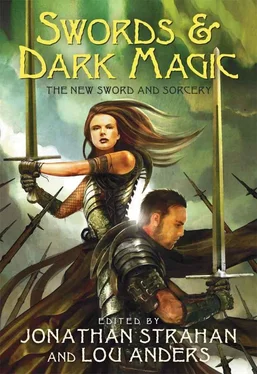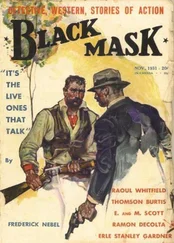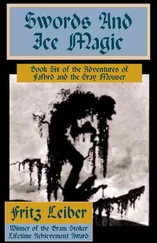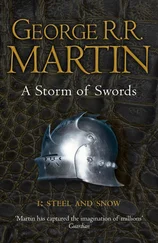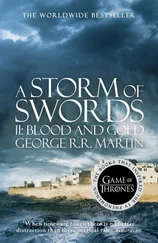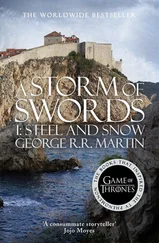She voided herself. She knew where she was bound.
Something passed between the Lady and the Limper. The stinky little sorcerer bowed deeply. He moved in on the girl, took hold of her arm, forced her to her feet. He pushed her toward the door he had wrecked.
The rest of us watched, every man wishing he had the power to stop them, every man knowing that, if the Lady had spoken truly, Tides Elba was a threat to the entire world. She could become the port through which the hideous shadow known as the Dominator could make his return. No doubt she was sought by and beloved of every Resurrectionist cult hoping to free the old evil from his grave. No doubt she was a prophesied messiah of darkness.
I glanced back. The Lady was gone. The end, here, was almost an anticlimax. But that was because we were out there on the margins, able to see only the local surface of the story. For the Company, the central fact would be we had survived.
We all went out and watched the Limper get ready to go.
He seemed nervous and unhappy. He shoved the girl into a sack. He sewed that shut, then secured it to his carpet with cording. Tides Elba would not evade her fate by rolling off the carpet while it was in flight. His liftoff into the late-afternoon light seemed erratic. He wobbled as he headed west.
I found Hagop in the shadows near where the Limper’s carpet had lain. He gave me a big grin and a thumbs-up. “He spotted it right away. Took it out, looked at it, and jumped like somebody just hit him with a shovel.”
“He got the message, then.”
Goblin stared westward, eyes still haunted, but said only, “What a waste of delicious girl flesh.” And then, “Let’s round up Elmo and One-Eye and go tip a few at the Dark Horse. Elmo has got the cards, don’t he?”
GENE WOLFE worked as an engineer, before becoming editor of trade journal Plant Engineering . He came to prominence as a writer in the late 1960s with a sequence of short stories in Damon Knight’s Orbit anthologies. His early major novels were The Fifth Head of Cerberus and Peace , but he established his reputation with a sequence of three long, multivolume novels— The Book of the New Sun , The Book of the Long Sun , and The Book of the Short Sun . His short fiction has been collected in The Island of Doctor Death and Other Stories , Endangered Species , Strange Travelers , and, most recently, The Best of Gene Wolfe . He is the recipient of the Nebula, World Fantasy, Locus, John W. Campbell Memorial, British Fantasy, British SF, and World Fantasy Lifetime Achievement Awards. Wolfe’s most recent book is the novel An Evil Guest . Upcoming is his new novel The Sorcerer’s House .
Sit down and I’ll tell you.
I was but a youth when I was offered for the Game. I would have refused had that been possible; it was not—those offered were made to play. As I was already large and strong, I became a knight. Our training was arduous; two of my fellows died as a result, and one was crippled for life. I had known and liked him, drank with him, and fought him once. Seeing him leave the school in a little cart drawn by his brothers, I did not envy him.
After two years, I was knighted. I had feared that I would rank no higher than bowman; so it was a glad day for me. Later that same day I was given three stallions, the finest horses ever seen—swift golden chargers with manes and tails dark as the darkest shadows. Many an hour I spent tending and training them; and I stalled them apart, never letting them graze in the same meadow or even an adjoining meadow, lest they war. If I were refused that many meadows on a given day, one remained in his stall while the other two grazed; but I was never refused after my first Game.
Now the Game is no longer played. Perhaps you have forgotten it, or perhaps you never had the ill fortune to see it. The rules are complex—I shall not explain them.
But I shall say here and say plainly that it was never my intention to slay my opponent. Never, or at least very seldom. It was my task to defeat my opponent—if I could. And his to defeat me. Well do I recall my first fight. It was with another knight, and those engagements are rarest of all. I had been ordered to a position in which a moon knight might attack me. It seemed safe enough, since our own dear queen would be sure to attack him if he triumphed. Yet attack he did.
Under the rules, the attacker runs or rides to the defender’s position, a great advantage. I had been taught that; but never so well as I learned it then, when I did not know I was to be attacked until I heard the thunder of his charger’s hooves. That white charger cleared the lists with a leap that might have made mock of two, and he was upon me. The ax was his weapon, mine the mace. We fought furiously until some blow of mine struck the helm from his head and left him—still in the saddle—half-stunned. To yield, one must drop one’s weapon; so long as the weapon remains in hand, the fight continues. His eyes were empty, his flaccid hand scarce able to grasp his ax.
Yet he did not drop it. I might have slain him then and there; I struck his gauntlet instead. A spike breached the steel, nailing his hand—for a moment only—to the haft of his ax. I jerked my mace away and watched him fall slowly from his game saddle. His head struck the wretched stony soil of the black square first, and I feared a broken neck. Yet he lived, and was mewing and moving when they bore him away. The spectators were not pleased with me, but I was pleased with myself; it is winning that matters, not slaying.
My next was with a pawn. She was huge, as they all are; bred like chargers, some say. Others declare that it is only a thing the mages do to baby girls. As you are doubtless aware, pawn’s arms are the simplest of all: a long sword and a shield nearly as tall as the pawn herself, and wider. Other than those, sandals and a loincloth, for pawns wear no armor. I thought to ride her down, or else to slay her readily with my sword. One always employs the sword against pawns.
It was not to be. She sprang to my left, my stroke came too late, and she stripped me from the saddle. A moment more and I lay upon the fair green grass of a sun square, with her sword’s point tickling my throat. “I yield!” I cried, and she grinned her triumph.
I was taken from the game, and Dhorie, my trainer, found me sitting alone, my head in my hands. He slapped my back and told me he was proud of me.
“I charged a pawn,” I mumbled.
“Who bested you.”
I nodded.
“Could happen to anybody. Lurn is the best of the moon pawns, and you had been charged by a knight scarcely a hundred breaths before.” (This last was an exaggeration.) “You had given mighty blows and received them. Two moves and you were sent again. Do you know how often a knight is charged by another, but defeats him? The stands are still abuzz with your name.”
I did not believe him but was comforted nonetheless. Soon I learned that he had been correct, for my bruises had not yet faded when I was put forward in a new game. That game I shall not describe. Nor the others.
We do not mix, yet I saw the pawn who had bested me twice more. Once we occupied adjacent squares, and though speaking is forbidden, her face told me she knew me just as I knew her. She spun her sword, grinning, and I raised my own and pointed at the sun. Her hair was black as night, her shoulders broad, and her waist small. Her muscles slid beneath her moon-white skin like so many dragons, and I knew I could scarcely have lifted the crescent moon-sword that danced for her.
The Hunas swept down upon us, and the games were ended. There was talk of employing us in battle; and I believe—yes, I believe still—that we might have turned them back. Before it could be done, they rushed upon the city by night. We fought and fled as best we could, I on Flare, my finest charger. For four days and three nights he and I hid in the hills, where I bandaged our wounds and applied poultices of borage and the purple-flowered high-heal that none but a seventh son may find.
Читать дальше
